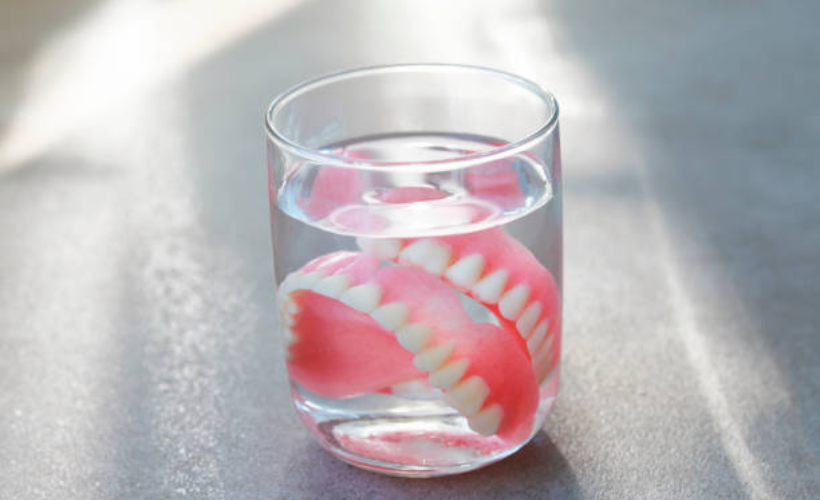While dentures can improve the quality of your life, wearers need to take proper steps to maintain them to avoid bacteria buildup. A lack of oral care can lead to denture stomatitis, causing pain, swelling, and redness in the mouth.
This guide will go over what denture stomatitis is, the symptoms that you should be on the lookout for, and how you can prevent this oral disease effectively.
Understanding Denture Stomatitis
Also referred to as chronic atrophic candidiasis, denture stomatitis is an inflammatory condition that’s often caused by yeast or fungus. Usually caused by a buildup of plaque and organic matter under the denture, which can lead to an overgrowth of the yeast or fungus Candida albicans. Other factors that can contribute to denture stomatitis can include poor oral hygiene, ill-fitting dentures, and wearing dentures for longer periods of time.
Denture stomatitis can happen to anyone with poor oral hygiene or a lack of denture care. It effects 15% to 70% of denture wearers, and most especially the elderly.
Symptoms of Denture Stomatitis: Early Detection Can Prevent Complications
Learning more about denture stomatitis and pain it can cause, can help with early diagnosis, preventing any further oral health complications.
Here are the most common symptoms of this fungal infection:
- Swallowing becomes painful or uncomfortable
- Soreness in the mouth or throat caused by inflammation
- Red or white patches in the mouth
- Sores and cracks on the side of the mouth
What Causes Denture Stomatitis?
There are several causes of denture stomatitis, some of which include the following:
- Ill-fitting dentures
- Poor oral hygiene
- High sugar or carbohydrate diets
- Wearing dentures for long periods (throughout the night)
- Smoking and alcohol
- Certain medications (certain types of antibiotics)
As one of the main causes of denture stomatitis … an ill-fitting denture should be repaired immediately. Improper placement can leave spaces for bacteria and yeast to breed and cause gum irritation and comfort is our #1 concern at Shreve Denture Clinic.
Who Are at Risk of Developing Denture Stomatitis?
It’s important to understand that denture-related stomatitis is a common fungal infection in the mouth, but it affects the elderly more than others. This happens when nutritional deficiencies, endocrine dysfunction, and immunosuppression are at a greater risk of developing denture prone disease.
While this fungal infection can affect anyone, it’s twice as common among men than women. People suffering from diabetes are also more prone to developing denture stomatitis.
In the mouth, there are glands that constantly produce saliva, which helps flush the mouth and dentures. It also lubricates and prevents cavity-causing bacteria from buildup.
An oral condition known as xerostomia (dry mouth) negatively impacts saliva production, resulting in a dry mouth. This often occurs when a person ages or takes certain medications. A lack of lubrication can lead to bacteria buildup and eventually oral health problems like denture stomatitis.
Denture age can also increase the risk of this fungal and yeast infection. As time passes, wear and tear can adversely impact these removable oral appliances. Gaps and improper fitting can become breeding grounds for Candida, resulting in denture stomatitis.
Another thing to remember is that although denture stomatitis may not be directly contagious like other diseases, people prone to thrush may still contract this fungal infection through the transmission of Candida.
How to Diagnose Denture-related Stomatitis
A quick visit to a professional denturist can help diagnose this oral disease. The dental professional will examine the mouth for redness, soreness, and cracks to determine the development of denture stomatitis.
In some cases, the dentist may swab your mouth and send the sample to a pathology laboratory for further confirmation.
What Are the Treatment Options for Denture Stomatitis?
While denture stomatitis can be a very painful condition, patients can take comfort in knowing that it is entirely treatable. Here are some of the ways denturits treat this fungal infection:
- Anti-fungal treatment: Dental professionals often recommend anti-fungal medications like nystatin or miconazole to combat denture-induced stomatitis. These are typically available in lozenges and ointments, helping reduce the irritation in the mouth.
- Laser therapy: When anti-fungal medications fail to provide relief, dental professionals may recommend low-energy laser therapy. It’s an effective treatment option that reduces inflammation, controls pain, and accelerates ulcer healing.
- Surgical removal: Sometimes, denture stomatitis may cause small nodules on the roof of the mouth to erupt. This can cause further irritation in people who wear dentures. Through surgical intervention, dental professionals remove these patches before guiding the patients on proper denture care.
Managing Denture-induced Stomatitis at Home
While a local denture clinic can help alleviate pain and discomfort associated with this fungal infection by recommending the right treatment plan, patients need to ensure proper denture care at home.
To help you manage denture stomatitis, here are some tips that you should follow:
- Avoid wearing dentures to expedite the healing process.
- Clean your dentures properly before wearing them.
- Practice good oral hygiene to avoid bacteria growth.
- Quit smoking and drinking, as it causes gum irritation.
Always clean dentures by letting them soak in water or a recommended solution overnight to prevent bacteria buildup. Be sure to always brush your dentures, as you would your real teeth with a proper denture cleaner. By taking extra precautions and following these tips, you can reduce the risk of oral health complications and improve healing.

How to Prevent Denture Stomatitis
Since prevention is better than cure, practicing good oral hygiene is the best way to prevent denture stomatitis. Brushing twice daily and rinsing with antimicrobial mouthwash can keep your teeth and gums healthy.
If you wear dentures all day, you should consider taking them out at night. This allows your gums and tissues to rest, preventing denture stomatitis from developing.
Since this fungal infection is often associated with dentures, it’s best to consider dental implants. They’re great for restoring aesthetics and functions and don’t move or shift while eating or talking.
Dental implants offer excellent stability and reduce the risk of oral diseases, including denture stomatitis.
When Should You Visit a Dental Professional?
According to the Canadian Dental Association (CDA), children should visit their dentist every six months, while adults should have their oral health checked out at least once annually.
People who wear dentures may experience irritation now and then. While this is common, it’s also essential to look out for the symptoms of denture stomatitis for early diagnosis. Any redness, soreness, or patchy areas require an immediate visit to your dentist.
Improve Your Oral Health with Shreve Denture Clinic in Leamington, Ontario!
Whether you need an experienced dental professional for a quick oral health checkup or to treat denture stomatitis, Shreve Denture Clinic has you covered. Our dentists have the right expertise, skills, and knowledge to assess your mouth and teeth before curating the perfect treatment plan.

Call us at 519.322.5900 to book a free consultation session with an experienced dental professional and take the first step to ensuring optimal oral health today!








